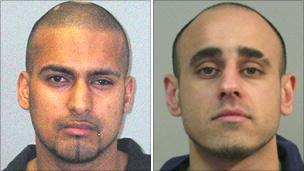Specialist unit investigates grooming of teenage girls
- Published

Mohammed Liaqat (left) and Abid Saddique, 27 were convicted of rape
The issue of the grooming of vulnerable teenage girls for sex is being investigated by the Child Exploitation and Online Protection Centre (Ceop).
The work coincides with the jailing of two Asian men who abused several girls aged between 12 and 18 in Derby.
Former Home Secretary Jack Straw has been criticised for suggesting there was a racial element to grooming.
Ceop told the BBC it was looking at the grooming of young girls as part of a wider examination of all abuse.
It was set up in 2006 and its staff include police officers and members of organisations such as the NSPCC.
A Home Office spokesman said Ceop, which is affiliated to the Serious Organised Crime Agency (Soca), would give further details of its work on grooming in due course.
'Specific problem'
On Friday, Mohammed Liaqat, 28, and Abid Saddique, 27, were jailed at Nottingham Crown Court for raping and sexually abusing several girls aged between 12 and 18, often after giving them alcohol or drugs.
The judge in the case said the race of the victims and their abusers was "coincidental".
But Mr Straw told the BBC there was a "specific problem" in some areas and called on the Pakistani community to be "more open" about the abuse.
He said: "These young men are in a western society, in any event, they act like any other young men, they're fizzing and popping with testosterone, they want some outlet for that, but Pakistani heritage girls are off-limits and they are expected to marry a Pakistani girl from Pakistan, typically.
"So they then seek other avenues and they see these young women, white girls who are vulnerable, some of them in care... who they think are easy meat."
Mr Straw's comments have been criticised by a number of commentators, including fellow Labour MP and chairman of the Home Affairs Select committee Keith Vaz, who called them "pretty dangerous".
A number of campaigners have spoken of the need for a national investigation into the issue of grooming.
David Niven, a child protection expert and former chairman of the British Association of Social Workers, told the BBC it was an organised crime that needed "a light shone on it".
"I'm certain that there isn't a particular ethnic element to it," he said.
"I would certainly go along with the fact that we need thorough root and branch investigation as to the vulnerability and abuse that occurs against our young people, because people - social workers and police especially - are struggling with it every day."
Martin Narey, chief executive of Barnardo's, also called for more research to be carried out.
But he said the issue, in his opinion, was not the targeting of white girls, but of those of all races who were vulnerable and isolated.
'Nothing in culture'
Mohammed Shafiq, director of the Muslim youth group the Ramadhan Foundation, said he believed race was an issue.
He said: "I first raised this two or three years ago and I got a lot of stick within the community from people who said I was doing the work of the BNP and stigmatising them.
"Most people didn't realise the seriousness of it. But now, after a series of court cases, things have changed. I have had a lot of support."
But he added: "These gangs that operate are criminals. There's nothing in their culture, there's nothing in their religion to suggest that this sort of thing is ingrained."
- Published8 January 2011
- Published7 January 2011
- Published7 January 2011
- Published25 November 2010